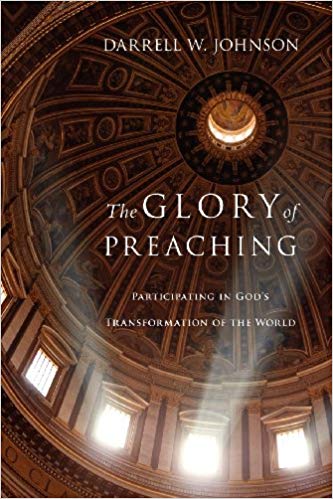Top Quotes and Takeaways From The Glory of Preaching

 As part of
A Year of Books on Preaching
As part of
A Year of Books on PreachingI posted a review of The Glory of Preaching earlier this week. Here are some of the top quotes and takeaways from this book.
Top Ten Quotes
Whenever a human being, Bible in hand, stands up before a group of other human beings, invites the gathered assembly into a particular text of the Bible and as faithfully as possible tries to say again what the living God is saying in the text, something always happens. Something transformative, empowering, life-giving happens. (p.7)
In the final analysis, the burden for the success of preaching rests on the Preacher’s shoulders, on Jesus’ shoulders. (p. 12)
One of the greatest needs of the preaching ministry, in any era in any cultural setting, is the continual recovery of confidence in the word of Jesus Christ. (p. 26)
The most basic motive in preaching is not to win the hearer (as crucial as that is) but to please the Sender. (p. 56)
Expository preaching is not about getting a message out of the text; it is about inviting people into the text so that the text can do what only the text can do. (p. 58)
The first and foremost discipline for preaching is staying in the text until we meet the Lord of the text. Everything hangs on this. (p. 61)
Why isn’t all the “preaching” having a greater effect on the culture? If I may be so bold to propose an answer, it is because too much of the “preaching” is good advice and not good news. (p. 62)
Yes, we can, and we should, try to help people understand the text’s radical implications. But applying the text is not the preacher’s responsibility. (p. 158)
Preachers, therefore, perhaps more than others, need to regularly receive gospel preaching; we need regularly to hear again that in Jesus Christ we have been brought into his status as the Son of God, and that we have been adopted by his Father as real daughters and sons, and that we too hear the Father say, “You are my beloved.” We, more than others, need to hear again and again that our worth is not determined by our work but by God’s gracious choice that we be his own. (p. 181)
In my experience, burnout in ministry does not result from overworking; burnout results from not honoring who we are and instead trying to be who we think we ought to be. And in my experience, joy comes by embracing who we are— though we are not everything we would like to be— and trusting the great Preacher to preach through the preacher he is making, redeeming and molding us to be. (p. 190)
Takeaways
- To preach well, recover your confidence in the power of God’s Word and the Holy Spirit. Dare to preach, and watch what happens.
- Focus less on getting a message from the text, and more on getting people into the text so the text can do its work.
- In preparation, spend time in the text until you meet the Lord of the text.
- Aim to help people understand reality differently through the gospel, rather than offering people more knowledge and advice. Help them to see the world as it really is according to God. Aim to change worldviews.
- Preaching is not the same thing as teaching, but in today’s culture, teaching is usually necessary for effective preaching.
- Match your preaching style to the style of the text.
- Preparation begins with prayer, and reading the text multiple times in different versions. Try to memorize the preaching text.
- Practice four steps in preparation: devotional, exegetical, hermeneutical, and homiletical. At the end, return to the devotional stage once again.
- Take advantage of breaks to improve your preparation process. To do this well, start early.
- Write your sermon for the ear, not the eye.
- Don’t look for ways to apply the text. Look for where the text leads us, and how we can enter in.
- Aim to plan what you will be preaching one year in advance.
- Honor how God has made you as a preacher.
More from Amazon.com






